It is not easy to stay ahead of demands and changes in today’s competitive and constantly evolving business environment. What is most significant is that contemporary organizations are not merely in search of bare-bones survival strategies; they are rifling for solutions on how to compete and win in their respective industries. The primary weapon in their arsenal includes Enterprise Resource Planning Software commonly known as ERP software. Picture a single solution that covers all aspects of business, moving through finance, human resources, supply chain, customers, and collaborating insightfully in real-time.
In this blog, we will discuss the definition of ERP systems, who uses them, the many benefits of picking the best ERP software for 2026, how to select the right system for your business, and the different types of systems you can choose.
It doesn’t matter if your company is still in its initial stage or an enormous corporation; learning ERP can open new possibilities for your organisation.
Let’s dive in!
What Is an ERP System?
ERP is an abbreviation for Enterprise Resource Planning and is a localized business management software that seeks to combine several business operations.
In other words, by accumulating necessary information and providing tools for their distribution between organizational departments including finance, human resources, supply chain, manufacturing, and customer relationship management, ERP systems increase organisational transparency.
This integration ensures that different teams in organizations gain the true views they need to make the right decisions in the least time.
Who Uses Enterprise Resource Planning Systems?
The application of ERP systems has been observed across small and medium-sized enterprises, and even in large organizations. Key users include:
Manufacturing Companies: These types of organizations use ERP tools to schedule, and control product production, stock, and quality, so that it can operate as planned.
Retailers: Different retail organizations use ERP software to monitor sales, stock, and customer behaviour and achieve strategic decisions that would improve the quality of service delivery.
Service Providers: ERP tools are used by firms such as consulting firms to facilitate project management and customer service hence proper timing on service delivery.
Healthcare Organizations: In the health sector, assorted structures such as hospitals and clinics depend on ERP systems to control information and compliance with the laws to enhance functioning.
Nonprofits: This makes ERP solutions ideal for use by nonprofit entities to keep records of donations as well as manage volunteers – which is a good reason to opt for the best ERP software for nonprofits.
Benefits of Using the Best Enterprise Resource Planning Software
Improved Efficiency
One of the key benefits of the best enterprise resource planning software is the ability to perform routine tasks, thus minimizing errors. This results in efficient processes being executed and reassigning responsibilities of lower-value activities.
Enhanced Data Visibility
Real-time access to information means that organizations can process information and make informed decisions that positively impact the performance of the business. This visibility also leads to better coordination with other departments, to achieve better synergy at the organizational level.
Cost Savings
The efficient ERP software improves the organization’s activities, cutting down the costs, which after all leads to considerable revenues and return on investments. These efficiencies can then be used to invest in other areas like upgrading technology, and retraining employees which will also improve efficiency.
Scalability
Another important aspect of the best resource planning software is that it can be easily integrated with new users and functions as the business expands, which makes it also highly effective in the preparation of the business’s processes. This translates to a better ability to meet market fluctuations without necessarily straining for new systems.
Better Customer Service
Through the gathers data from ERP systems can easily and quickly promptly address customer inquiries hence improving customer satisfaction and loyalty. Increased customer satisfaction is not only effective in attaining a higher retention rate but also enhances possibilities for offering the company’s products and services to the customers, thus attaining higher revenues.
How To Choose the Best ERP System
Identify Your Needs: The best strategy involves evaluating current business processes to point out which features will be useful in your organization. This is because knowledge of your special needs will assist you to find the suitable ERP software towards the achievement of organizational goals.
Budget Considerations: Total cost of ownership is a very important factor to consider when making a selection on an ERP system to implement. This covers the cost of the software licenses, the implementation charges, and the often subtle monthly charges that must be considered so that you work with a solution that gives good value and is affordable.
Scalability: They should be able to grow with your business and here I mean as your business expands your software should be able to expand with your business. Ascert backup your business needs in the future; that is, it must be able to meet increasing numbers of users or more functionalities if your business expands in the future.
User-Friendly Interface: There is nothing more important for gaining more users than having a clear and as close to simplest as possible interface. Moreover, intuitive tools allow for shortening the training period and increasing the usage of the possibilities of the best RP software by employees.
Customization Options: As much as you look for an ERP that meets your present needs, ensure that you see one that is flexible enough to be adjusted to meet your current business processes. Customization helps firms to uphold competitiveness and apply the most suitable ERP to organizational operations.
13 Best Enterprise Resource Planning Software in 2026
1. SAP S/4HANA
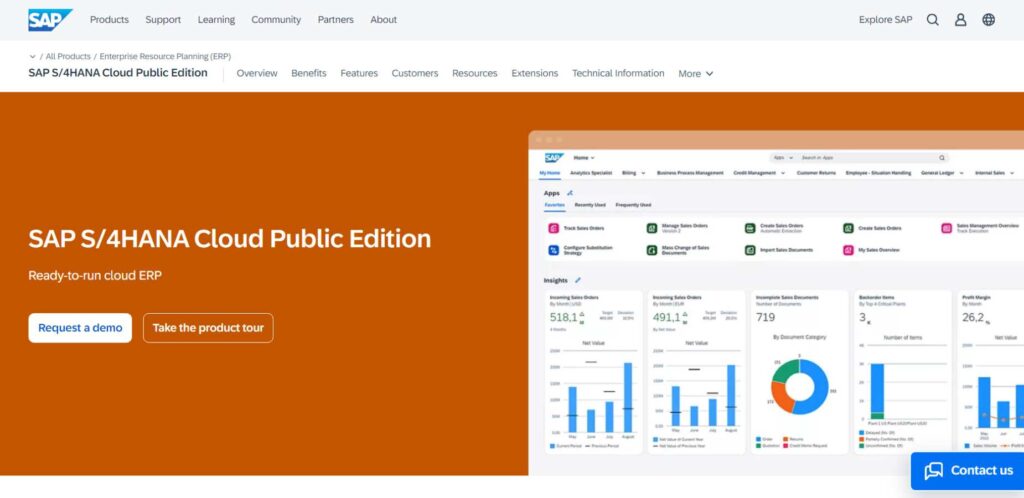
SAP S/4HANA is an absolute titan in the ERP industry, and the solution is created primarily for large organizations that need a powerful solution. Due to the massive capacity it has, organizations are in a position to make quick decisions and hence react to changes in the market significantly.
Different options of SAP S/4HANA cover almost all kinds of industries, ranging from manufacturing to services, so organizations can adjust the system to their needs.
Key features:
- Real-time data processing
- Combined with Artificial intelligence and machine learning
- Accurate and complete tools for articulating the analytics and the report.
Pros:
- Helps in real-time processing and improves decision-making
- Combines efficiently with AI and machine learning
- Can be customized according to your needs
Cons:
- Very limited access for comparatively small businesses
- The pricing system is very complex
Ideal For: Large enterprises in various industries.
Pricing: Customized pricing based on needs.
Website: https://www.sap.com/india/products/erp/s4hana.html
Rating: 4.5/5
2. Oracle ERP Cloud
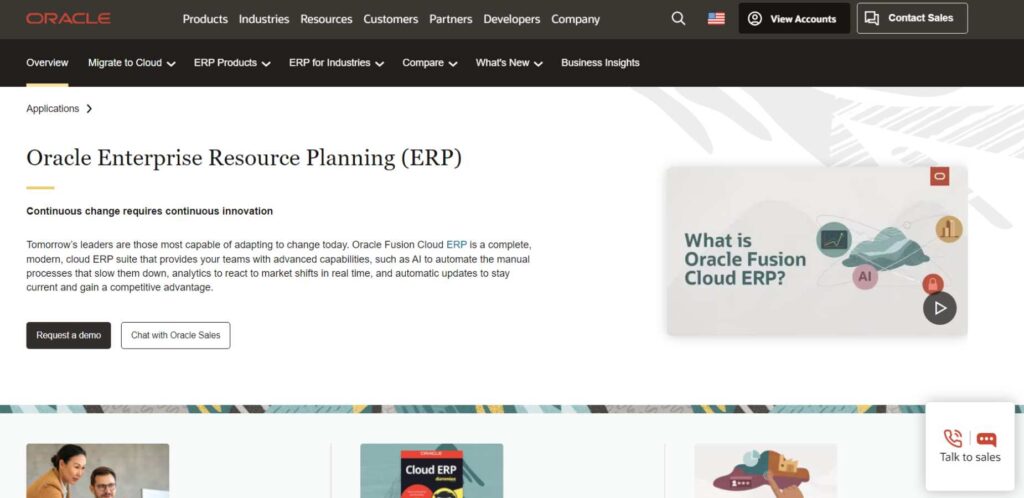
Oracle ERP Cloud is a strong and complete cloud solution that is especially strong in its finance and project dimensions. It incorporates statistics and value-added reporting features for aiding the business organizations in formulating strategies. Especially so for enterprises who need a software solution that can scale up and deliver on performance.
Key features:
- Sophisticated financial risks and financial statements
- Using artificial intelligence in decision-making for improved results
- Tools for analyzing compliance with the law and preventing risks
Pros:
- Great financial management
- Reporting features
- Uses AI for good decisions
- Best suiting for small businesses
Cons:
- Can be very complex to learn
- The price is very high
Ideal For: Medium to large enterprises.
Pricing: Starts at approximately $175/user/month.
Website: https://www.oracle.com/erp/
Rating: 4.4/5
3. Microsoft Dynamics 365
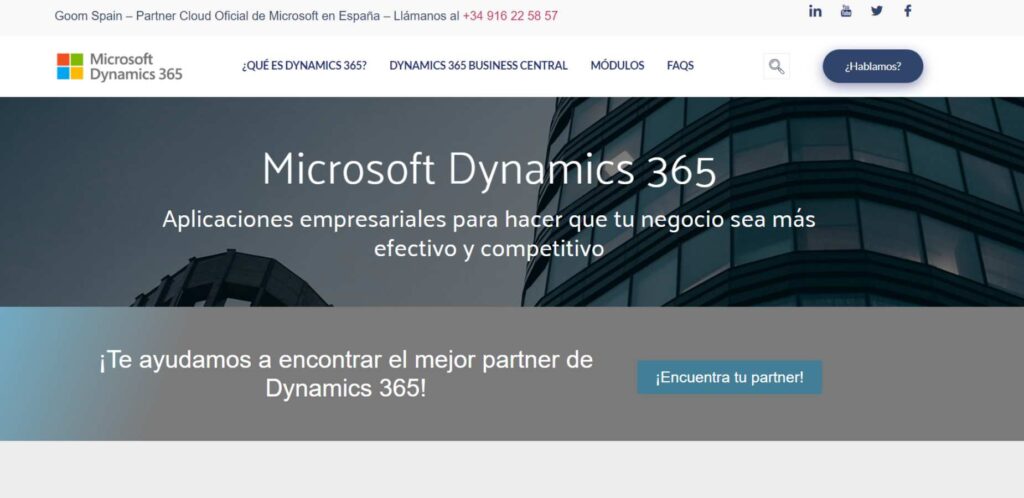
Microsoft Dynamics 365 is an adaptive business management tool that solves a wide range of business operations to streamline and provide smooth ERP integration of other Microsoft tools. It has a portfolio of easy-to-install solutions geared toward particular enterprise tasks, such as selling, servicing clients, or managing finances. Due to this, the software is ideal for use in any company regardless of its size, from new start-up firms to giant companies.
The simplicity in the Icon constituencies and highly flexible reporting features make it possible for teams to understand the data analyzed and come up with strategies hence the reason it is preferred when integrated technology is required.
Key features:
- Application that fits into an organization’s organizational structure
- Additional features such as improved reporting and analytics function
- Being an inherent part of the Microsoft product line and ecosystem
Pros:
- Can be used well with other Microsoft tools
- Very user-friendly and has great customisation
- Great for all businesses of all sizes
Cons:
- Not user friendly
- Very expensive
Ideal For: Businesses of all sizes.
Pricing: Starts at $70/user/month.
Website: www.microsoftdynamics365.com
Rating: 4.3/5
4. Infor CloudSuite
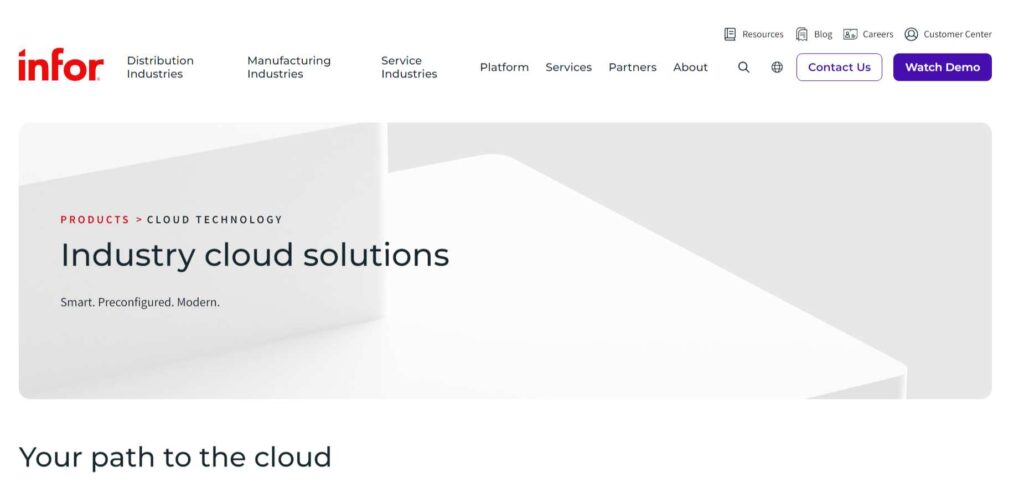
Infor CloudSuite focuses on industry verticals ERP solutions, especially for manufacturing as well as distribution industries. One of the ways that G: synchronizes its functional capabilities with the needs of fall industries is through the use of cloud-based architecture.
Thanks to its convenient and intuitive web interface and rich instrumentation for constructing efficient analytical models, Infor CloudSuite effectively assists an organization in minimizing bottlenecks, optimising the supply chain, and maximising efficiency.
Key features:
- Current overall industry-specific tools for optimisation
- Very convenient compared to cloud machines and can be updated frequently.
- Analytic tools to help businesses in better decision-making
Pros:
- Great tools to improve functionality
- Easy to use
- Frequent updates as per user needs
Cons:
- Not much customization as compared to users
- The pricing structure is very complex
Ideal For: Manufacturing and distribution sectors.
Pricing: Customized pricing based on requirements.
Website: https://www.infor.com/products/cloud-strategy
Rating: 4.2/5
5. VasyERP
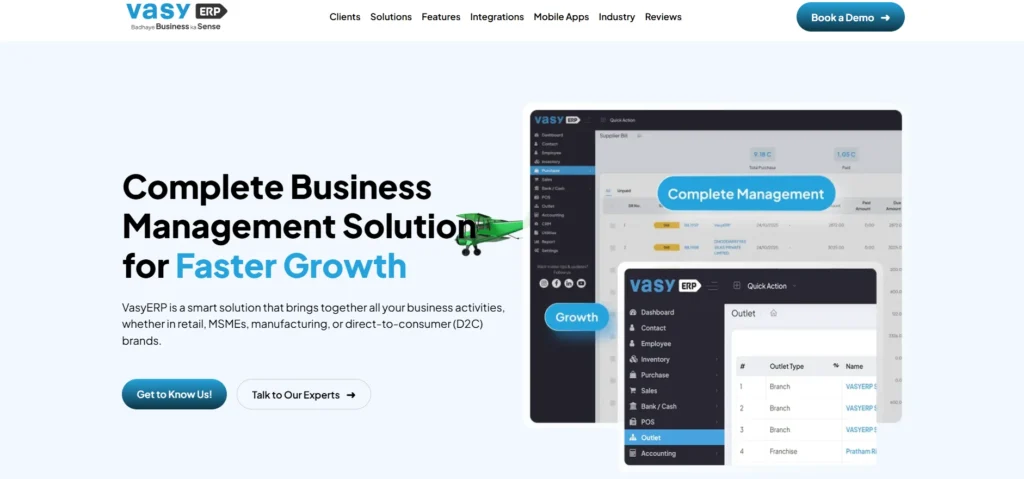
VasyERP is a cloud-based ERP and POS solution designed to help small and growing businesses manage inventory, billing, accounting, and customer relationships from a single platform. It is ideal for retailers, wholesalers, and multi-location enterprises looking for an all-in-one system.
Features:
- Cloud ERP with real-time inventory and stock tracking
- Integrated POS and billing system with online/offline capabilities
- Accounting and tax-ready invoicing
- Purchase, supplier, and expense management
- CRM with customer database, loyalty programs, and offers
- Multi-location and multi-user support
- Real-time dashboards and business analytics
- Mobile app access for on-the-go operations
Pros:
- All-in-one solution for small and medium businesses
- Scalable for multiple branches and locations
- Cloud-based access from anywhere
Cons:
- Support and documentation may vary based on region and product update cycles
- Do not provide a free trial
Pricing: Visit the website for detailed pricing.
Website: https://vasyerp.com/en-ae/
Ratings – 4.7/5
6. NetSuite
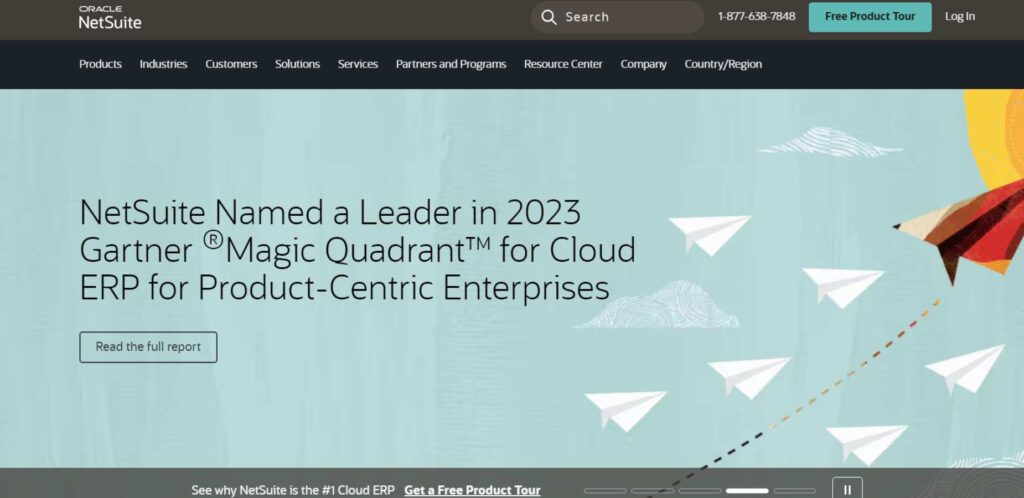
NetSuite is one of the most favoured cloud-based ERP solutions among small and mid-sized businesses it offers a wide range of tools ranging from financial management to e-commerce, CRM and inventory control. The software integrates multiple aspects of an organization’s business into one central system, which will enable organizations to run efficient operations.
Thanks to its simple navigation and numerous options for customization, the system can be successfully used by teams and solve any problem in the shortest possible time by making the right decisions based on data.
Key features:
- Full integration of e-commerce capabilities to support smooth sales management.
- Real-time tools to manage fiscal figures and financial statements
- User-friendly interface with customizable dashboards
Pros:
- Good for financial management and CRM
- Real-time tools for quick decision
- Easy-to-use interface
Cons:
- Very expensive
- Will require extra customization to meet your needs
Ideal For: Small to medium-sized businesses.
Pricing: Starts at $999/month + $99/user/month.
Website: https://www.netsuite.com/
Rating: 4.4/5
7. Odoo

Odoo is an open-source ERP software tool and has seen massive development with a feature that can be easily tailored to suit the needs of a business hence a perfect solution for SMBs. Thanks to the modular approach, organizations are offered to implement only definite applications that will bring them value. From sales to customer relationship management to inventory management to project management, Odoo has the functionality needed by a business and expands as needed.
Key features:
- Modular applications to reflect each client’s specific needs
- Proper project management and customer relation management solutions
- Relativity low price which, however, provides very many features
Pros:
- High customizations
- Economical for small businesses.
Cons:
- Difficult to setup
- Quality is a bit compromised
Ideal For: Small to medium-sized businesses.
Pricing: Starts at $24/user/month.
Website: https://www.odoo.com/
Rating: 4.3/5
8. Epicor ERP

Epicor ERP is designed for the manufacturing and distribution industries to support the supply chain, sales and operations planning, and financial control. Its emphasis on solutions for particular industries assists organisations in increasing organisational efficiency and decreasing expenditure.
The highly intuitive layout of the Epicor ERP system makes it easy to use, while the high confurability of the system enables organizations to apply ERP to match company processes in the best way possible, so they can meet market challenges quickly and effectively.
Key features:
- Supply chain management tools for efficient analysis
- Production control and inventory management abilities
- Possessing sound financial skills
Pros:
- Customised for manufacturing to your needs
- Great supply chain
- Easy-to-use layout
Cons:
- Difficult to customize
- Not very good for non-manufacturing industries
Ideal For: Manufacturing and distribution companies.
Pricing: Customized pricing based on needs.
Website: https://www.epicor.com/en/products/enterprise-resource-planning-erp/
Rating: 4.2/5
9. Sage X3

Sage X3 is an international mid-market ER P solution with a centre of gravity in financial management, operations and compliance. Sage X3 Solution works on efficient changes to business processes and hasổianalytics and reporting instruments for comprehension.
Its Graphical User Interface guarantees team simplicity while working on the system hence improving productivity and organizational decision making across teams.
Key features:
- State-of-art project management and compliance solutions
- It incorporates great analytic and reporting features
- Easy-to-use interface to allow for easy control of the website.
Pros:
- Great focus on finance
- User-friendly interface
- Good tools for analytics and reporting
Cons:
- Not many advanced features
- Time-consuming to use
Ideal For: Medium to large enterprises.
Pricing: Customized pricing based on user requirements.
Website: https://www.sage.com/
Rating: 4.1/5
10. Workday

Workday has tight links with the human capital management and financial management solutions necessary for enhancing the solutions of HR management and the methods of financial planning. Its feature includes data collection from an organisation’s cloud data systems and giving real-time data to support various decisions.
Being a simple-to-use application with a heavy focus on the users, Workday is best suited for organizations seeking to boost their employee satisfaction.
Key features:
- Integrated human tender management requirements
- Time series analytics for improved decision-making
- Analyzing and predicting instruments for controlling financial activity
Pros:
- Grey with HR and Finance
- Real-time analytics for better decision-making
- User friendly
Cons:
- High price especially for smaller businesses
- Complex set up
Ideal For: Organizations prioritizing HR and finance.
Pricing: Customized pricing based on needs.
Website: www.workday.com
Rating: 4.4/5
11. Zoho ERP
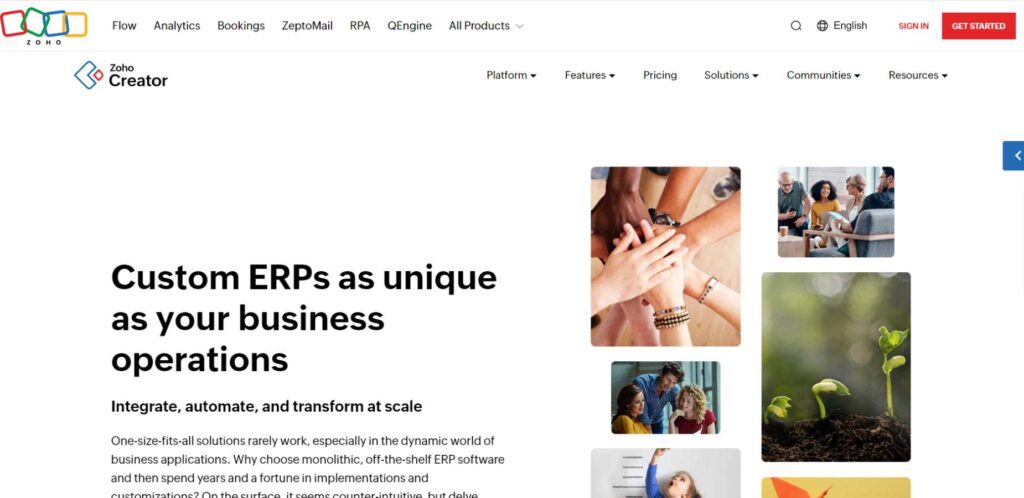
Zoho ERP is inexpensive with features that accelerate different business applications, and therefore suitable for small businesses. Its solutions include CRM software, project and inventory management tools that assist organizations enhance their performance. Small companies can utilize Zoho ERP and its clear design without making large investments and fine-tuning their solutions.
Key features:
- CRM and marketing project management functionalities within a single software
- This website is user-friendly and easy to navigate thanks to the menu at the top.
- Competitive pricing strategy with many features for business operations.
Pros:
- Cost-effective for small businesses
- Great functions
- Easy-to-use design
Cons:
- Lacks advanced features
- Not that good for large businesses
Ideal For: Small businesses seeking comprehensive solutions.
Pricing: Starts at $40/user/month.
Website: https://www.zoho.com/creator/industries/custom-erp-software.html
Best low-code-based SAP ERP alternative
Rating: 4.2/5
12. Acumatica
Acumatica is an open, flexible, and cloud-based ERP system ideal for mid-market companies. It has good reporting features, including the ability to manage the financial aspects of an organization or group and strong products and projects, as well as easy changing of templates according to the organization’s actions. It is for this reason that Acumatica can be useful for companies who want a platform that is both friendly and capable of improving the company’s functionality.
Key features:
- All-inclusive financial and project management resources
- Homescreens that would enable a user to receive personalized information.
- Using the cloud for flexibility to be accessed anytime and can be updated anytime also.
Pros:
- Open and flexible
- Ideal for mid-sized companies
- Templates easy to customize
Cons:
- The pricing structure is a bit complex
- Difficult to set up
Ideal For: Mid-sized companies seeking adaptability.
Pricing: Starts at approximately $1,000/month for unlimited users.
Website: www.acumatica.com
Rating: 4.5
13. Syspro
Syspro is developed for those companies that are in the manufacturing and distribution business and includes several tools to improve the effectiveness of inventory control, production and supply chain. It’s easy to use, flexible and has cool characteristics that assist organizations to dematerialize hazardous, and hence expensive activities. This centralizes processes and offers real-time decisions that can contribute to managing the market’s complexity and improve organizational performances worldwide.
Key Features:
- Concurrent inventory control or spiritual tracking
- Application in production management for postings concerning operational improvement
- Supply chain optimization includes aspects of optimization as a collection of features for allocating resources.
Pros:
- Well-suited for industry-specific solutions
- Strong supply chain features
- Easy to customise dashboards
Cons:
- Steeper learning curve
- Pricing is very high for small business
Ideal For: Manufacturing and distribution businesses looking to improve operational efficiency.
Pricing: Customized pricing based on individual requirements and configurations.
Website: https://asia.syspro.com/
Rating: 4.2/5
Conclusion
Selecting the right ERP can help change the face of any enterprise. Thus, after having learned what ERP is and having determined your requirements, you can increase productivity and the quality of decision-making.
If you wish to know who provides the best resource planning software or the best ERP software for non-profits then you should stay updated about the available solutions to be ahead of the competition. In the modern interconnected business environment, ERP is no longer a mere operating utility; it is a key part of a strategic plan.
This blog will help you choose the best enterprise resource planning software that suits your needs.
Hope this blog was helpful.
Thank you!
Frequency Asked Questions (FAQs)
What is the primary objective of implementing an ERP system?
Mainly, an ERP system is designed to consolidate many organizational processes into one system to improve organizational activity and information transparency. The use of the most suitable ERP software can help manage the flow of processes and develop strategies and tactics.
How long does it generally take to effect changes in an ERP system?
Most times the implementation of Enterprise Resource Planning Software can take anything between a few months and more than a year. That is why the management of organizations must consider the above factors in the planning process when selecting the best ERP system since factors such as system size and customization requirements will determine the time needed to complete the implementation successfully.
Can ERP systems be customized?
Indeed, many implementations of ERP solutions are provided with the possibility of customization to serve particular organizational requirements. But one should bear in mind that localization may be an issue of maintenance so it is always beneficial to find the best resource planning software with ideal specific features for the company and simultaneous ease of use.
What benefits do ERP software hold for compliance?
This in a way assists compliance as most Enterprise Resource Planning Software have features that include audit trails together with automated reports, to enable organizations to adhere to the current industry standards. Thus, the idea of ERP solution deployment decreases compliance hazards while increasing the firm’s stability and credibility.

